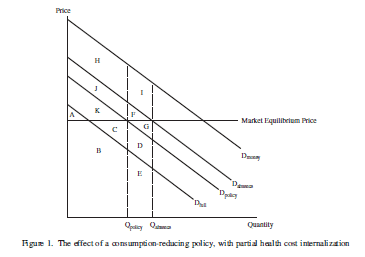April 13, 2014
Stanton A. Glantz, PhD
More problems on the horizon for cost-benefit analyses at the FDA (and likely other places)
I have prevously written about the serious problems with the way that the FDA has done cost-benefit analysis of the effects of tobacco control policies, most notably warning labels on cigarette packages. Among other things, the FDA, led by economist Clark Nardinelli, assumes that steps that will reduce smoking have the effect of depriving smokers (and potential smokers) of the "pleasure" of smoking, quantified using the economic idea of "consumer surplus." Counting this lost pleasure as a cost led the FDA to substantially discount any health benefits of stopping (or not starting smoking), which made the regulation harder to defend in court..
On February 25, 2014, Nardinelli and colleagues at the Office of Management of Budget published a short paper in Health Economics, "ESTIMATING THE BENEFITS OF PUBLIC HEALTH POLICIES THAT REDUCE HARMFUL CONSUMPTION," that argues that the consumer surplus discount is even higher than that used in the FDA's cost-benefit analysis of warning labels, up to a 99% discount of the health benefits of reducing "harmful consumption." (The smallest discount they estimated was 67%.)
They also suggested that this approach also be applied to other harmful substances, such as those that produce obesity.
Their paper replaces the extensive literature on smoking behavior and nicotine addiction with a simple economic model (see figure). The authors do recognize that they are making some assumptions, but nevertheless argue that the huge discounts of any health benefits because of lost consumer surplus are a robust finding.
This paper would be an interesting acadmic exercise that could be dismissed as a naive attempt to model smoking behavior, except that the authors are the ones who are deciding what the FDA and OMB think the costs and benefits of public health interventions are. If this thinking continues to dominate the regulatory process in the Obama Administration it will doom any meaningful regulation of tobacco products (on the grounds that there is little net benefit) and probably lots of other public health regulations as well.
I fully expect to see this logic in the FDA's e-cigarette "deeming" rule (when the Administration finally releases it), which will probably make any regulations all but impossible.

Comments
Tea Party take-over at FDA and OMB
While I haven't been able to access the full article, it would seem to be completely in line with long-time right-wing critics of public health interventions with respect to non-infectious diseases: behaviors that cause these diseases are entirely a private matter for the individuals involved, so long as they had access to the relevant information.
Aside from the moral obtuseness of this position, both respects to individuals currently suffering disease ("they made their bed") and to those contemplating the behavior ("the government has no responsibility even to guide people toward a healthy lifestyle"), it also lives in a social science time warp, before the work of the past 25 or so years in behavioral economics and related fields. No one who takes seriously the behavioral science findings on addiction, hyperbolic time discounting, problems of imagining the concerns and preferences of one's future self, self-exempting beliefs, cognitive dissonance, the delayed development of the parts of the brain responsible for self control, etc., etc. would write this kind of nonsense. Unfortunately, even after the psychologist Dan Kahneman received a Nobel prize in Economics for his work debunking some of the postulates of neoclassical economics, people trained in this tradition keep trundling on, leaving devastation in their wake.
Dick Daynard
Re: Tea Party take-over at FDA and OMB
It's a position convenient to the creators, funders, and manipulators of the Tea Party: blame the customer, do nothing that would affect sales.
http://tobaccocontrol.bmj.com/content/early/2013/02/20/tobaccocontrol-20... title="http://tobaccocontrol.bmj.com/content/early/2013/02/20/tobaccocontrol-20......
The fact that it's nonsense and long since disproven has never been a obstacle for those putting it forward dressed up as science when it's convenient for the sponsors.
So it's not all about people trained in this position; it's also about their being taken seriously when their position is ridiculous. It's about why that position keeps coming back even after it's been debunked rigorously and repeatedly. It's about cui bono.
The solution: shine the light on it.
Jon Krueger
Add new comment